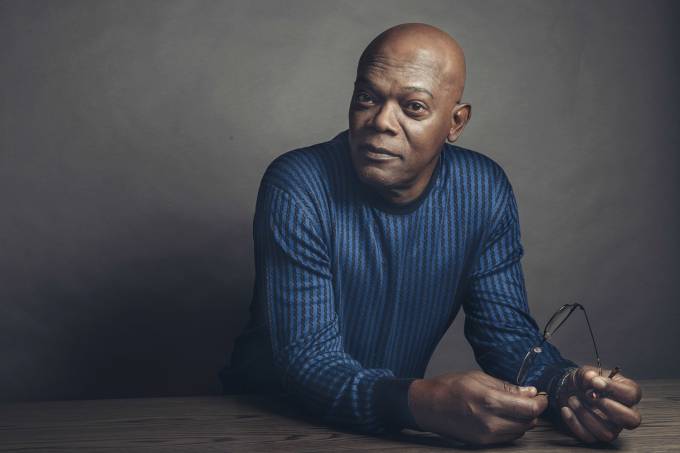In the late 60’s, Samuel L. Jackson he was studying marine biology in Atlanta when he was seized by new vocations: theater and political activism. Living in the city of Martin Luther King Jr., he combined his taste for art with the anti-racist struggle in socially themed pieces. He soon caught the attention of Spike Lee, one of the most positioned directors in Hollywood on the black question. Versatile and good-natured, Jackson soon became a sought-after name. He rose to fame with Pulp Fiction (1994), the first film in a prolific partnership with Quentin Tarantino. He made Jurassic Park with Steven Spielberg and even got a unique purple lightsaber in Star Wars. The resume of unbeatable characters reached its apex with Nick Fury, the boss of Marvel’s heroes. No wonder the aging image of the actor in the series The Last Days of Ptolemy Gray, from Apple TV+, shocks. In it, 73-year-old Jackson lives a nonagenarian who accepts a temporary cure for dementia in order to fulfill an old agreement and avenge his nephew’s death. With a penetrating and smiling look, Jackson told VEJA about the series, racial affirmation and the trajectory that made him the most profitable actor in the box office in the world.
You are 73 years old and play a 91-year-old senile man in the series The Last Days of Ptolemy Grey. Is getting older something that scares you? No, I’m not afraid of getting old, I’m feeling pretty good with the passing of the years. Of course, I haven’t reached 90 yet, so I don’t know how it’s going to be, if I’m going to change my mind. When I looked at myself in the mirror, with the clothes and makeup of an aging man, I was shocked. As an actor, it was a very enjoyable and complex exploration, as I had never played such a vulnerable character. And, as a producer, for years I wanted to adapt the book that tells this story, written by Walter Mosley. I’m a fan of the way he tells stories associated with American wounds — and, having grown up in the racist South of the United States, I understand them all too well.
His filmography is full of powerful characters, from Mace Windu, a jedi from the Star Wars saga, to bloodthirsty types in films by Quentin Tarantino and Nick Fury, from Marvel. Did you choose to privilege these roles in his career for any specific reason? Deep down, everyone wants to be the almighty guy and I’m no different. I got used to it and accepted the fact that it’s these strong characters that the audience likes to see me play. In addition to those mentioned, which are the most popular, I was cast in several roles of, let’s say, empowered men who have an inner strength and with whom I identify, as in Tempo de Matar (1996), in which I play a father taking revenge for his daughter’s violence, or 187: The Code (1997), in which I am a teacher who deals with student gang members. But what really attracts me is not physical force, much less violence.
What attracts you anyway? It’s something that goes further. Many of the characters I accept to play have an indomitable willpower. They aren’t exactly heroic or powerful for any specific reason. But these are people who are willing to face whatever comes. That’s what I’ve also been doing throughout my life.
“Everyone wants to be the all-powerful guy and I’m no different. I got used to it and accepted the fact that it’s these strong characters that the audience likes to see me play.”
What was it like, then, to assume the facet of a person with dementia? It was a role that required a very particular physical performance. My body needed to convey the message of how that man interpreted the world. His expressions, the blank look in his eyes, the confusion when he was charged with a memory he should have had but couldn’t find. The constant fear. It’s worth remembering that he doesn’t stay like this all the time: the script has a twist in which he accepts treatment to be cured for a while, before getting drastically worse or dying. An exchange I would also make in his place.
Why do you think so? My mother had dementia. My grandfather had it too, as did an uncle and two aunts. So I live surrounded by this ghost. I was inspired by them. My purpose in taking on such a dislocated body is to make the viewer of the series get involved with those who live in this situation and notice the difficulty and impotence that it is to be the family member of someone with dementia. Loving someone who doesn’t recognize you is the most devastating feeling in the world. This series was a healing process with my past and a way to honor these family members.
The importance of memory is the guiding thread of the script. Today, with social networks, the many movements that try to rewrite history and deny wounds, such as the Holocaust and the enslavement of Africans, have become evident. How do you see this setback? Memory is very important, but it is not always reliable. After all, each of us has our version of how something happened from a particular point of view and experience. When I was a child, I liked to listen to older people, my grandfather’s brothers and relatives of relatives to listen to the oral history. Knowing what they went through, their experiences, and that of their parents. These narratives helped me know who I was, where I came from, and how the world had or hadn’t changed over time. So I knew what they weren’t teaching me at school or in the papers. Throughout my life, I began to go beyond the information I received. Everything needs to be checked. Take what you heard, what they wrote about it and try to put the narratives side by side to draw your conclusions. Only then can we find something close to the truth. Continues after advertising
You were involved in the black civil rights movement in the United States, close to Martin Luther King Jr. He later became one of the few black leading men in Hollywood — and is now the highest-earning actor in history, with films that have grossed $27 billion at the global box office. How do you analyze this unique trajectory and its legacy so far? I don’t know if my work and activism had any particular effect on Hollywood. From the bottom of my heart, though, I really hope so. I hope that my committed way of working and the opportunities I embraced helped open doors for young black actors to come in. For opportunity is the key for someone to prove that they are worthy, that they are talented and able to work beyond their color. And who knows, I’ve inspired someone to at least try to reach a prominent place in their career. I didn’t have a plan in place. When embarking on this life of an actor, I did not aim to be an example. But I like to think that the popularity of my face helped someone my color get hired somewhere.
The Apple TV+ series, by the way, has a mostly black cast, which is not often seen. Was that something that attracted you to the script? Despite being rare, for me an all-black cast is nothing new. After all, I’ve done a lot of movies with Spike Lee — like Do the Right Thing in 1989 and Jungle Fever in 1991. But my foundation, long before film, was theater. My work on stage involved this desire to spread stories from the black community and also to appeal to a black audience.
How did you achieve this goal? I worked for a long time at The Negro Ensemble Company (NEC), an all-black company in New York. I made the circuit of plays by August Wilson (a black American playwright) and many plays by Shakespeare, also in New York, aimed at a black audience. So it’s something I cherish and that’s part of my story.
Diversity is a hot topic in the entertainment world, and it has been causing a stir in the midst of awards such as the Oscars and the Golden Globes, which lost relevance when accused of racism. What does the industry lack to fully assimilate different ethnicities, beyond just reacting to political correctness? You have to understand that there are a variety of voices to be heard. It’s a joy for me to be able to do a show like this, for example, showing what life is like for a group of people who are constantly affected by what happens outside their racial spectrum.
“By embarking on this act of being an actor, I didn’t aim to be an example. But I like to think that the popularity of my face helped someone my color get hired somewhere.”
Can you explain better? People of color experience particular situations linked to their color, and telling these stories gives them the opportunity to see, from the inside out, a world that the public may not know much about. Showing these people only as part of a plot around white people is like having a black employee at home who is considered part of the family, but deep down, deep down is not. You can love and engage with someone of another ethnicity and learn from that person, but only when they are represented in a series or movie with a majority cast of their peers is it possible to meet them on another level of intimacy. For there is no dominant social culture influencing their actions.
In the series, you share the spotlight with a teenager, played by Dominique Fishback, who takes care of Ptolemy and makes him understand that women are not as fragile as he thought. Like her character, did she learn anything new about feminism? Being a man and knowing how the world works, I say that life is full of sharp corners ready to hurt us, but those obstacles can be better assimilated when you are loved by someone who knows you well, such as a woman. Ptolemy has been brushed aside like a piece of rubbish when Robin, his young friend, appears. She takes it out of the trash, polishes it, and turns it back into something of value. She’s a person who fixes what’s broken and that’s how I see women — not that that’s their job, but women are very good at organizing chaos and fixing what seems to be beyond repair.
You’ve been married for forty years to actress LaTanya Richardson—and during that time, she’s helped you fight drug addiction. Did his wife also “fix” him? Yeah, let’s just say so, she fixed me. LaTanya also took me out of the trash, polished me and set me back on my feet. But in my case, it was me who was throwing myself away, not the rest of the world. She helped me get out of this and rediscover myself, especially in my work. Published in VEJA of March 16, 2022, issue # 2780 Continues after publicity

